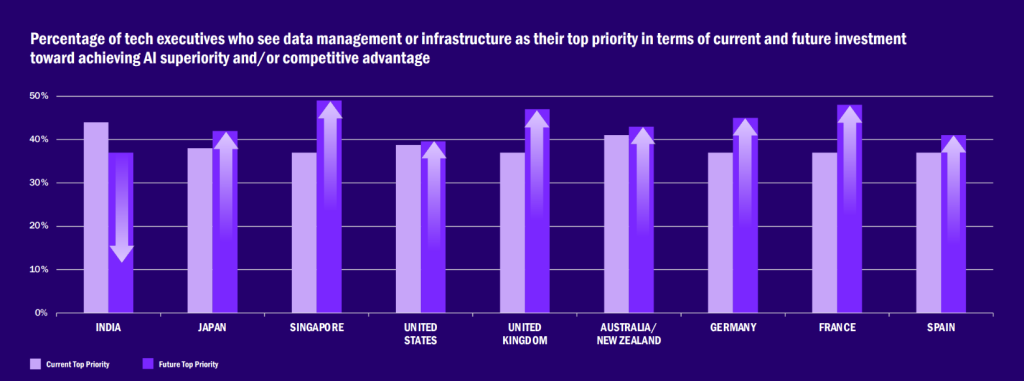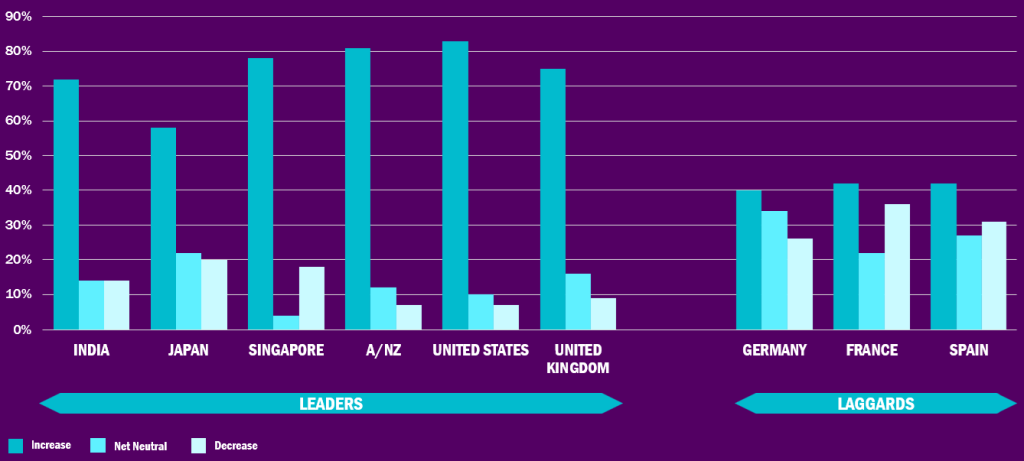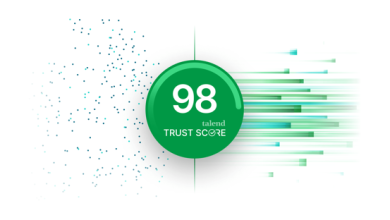NetApp’s 2024 Data Complexity Report Reveals AI’s Make or Break Year Ahead
Organisations Worldwide Brace for a Year of AI Transformation, Security Challenges, and Sustainability Imperatives

NetApp®, the intelligent data infrastructure company, released the 2024 Data Complexity Report, which examines how global organisations are navigating the increasing complexity of managing their data for Artificial Intelligence (AI). This year’s report provides a global view into how AI will impact organisations in 2025 and beyond, offering insights to help businesses leverage AI’s potential while navigating the complexities and risks that accompany this transformative technology.
“2025 is shaping up to be a defining year for AI, as organisations transition from experimentation to scaling their AI capabilities,” said Gabie Boko, Chief Marketing Officer at NetApp. “This year’s Data Complexity Report shows that businesses are making significant investments to drive innovation and efficiency, but these efforts will succeed only if global tech executives can address the mounting challenges of data complexity, security, and sustainability. Intelligent data infrastructure, with unified data storage at its core, will be key to unlocking AI’s potential.”
AI Investment: Will AI Break the Bank?
Two-thirds of companies worldwide admitted in the 2024 Data Complexity Report that their data is either fully or mostly optimized for AI. However, despite this progress, 2025 will still demand investment in AI and data management. In fact, 40% of global technology executives believe that unprecedented investment in AI and data management will be required for their companies in 2025. While companies have made strides in optimising data for AI, achieving future breakthroughs will demand even greater commitment and resources.
The 2024 Data Complexity Report classified the surveyed markets into AI leading and AI lagging countries. The four APAC markets of India, Japan, Singapore and Australia & New Zealand (A/NZ) all fall into the leading bucket, with the overall proportion of APAC respondents saying that their business’s data is fully or mostly optimised for AI averaging 73%, slightly above the global number.

Data Silos: Will Your Data Impede AI Success?
Data unification is emerging as a critical driver of AI success, with the 2024 Data Complexity Report finding out that 79% of global tech executives recognise the importance of unifying data to achieve optimal AI outcomes. Companies that prioritise unifying data are more likely to reach their AI goals in 2025, with only 23% of companies that prioritise unifying data saying they will not reach their goals, versus 30% of companies that do not prioritise unifying data.
Investing in data management and infrastructure has become the top priority for organisations, with executives emphasising it twice as much as other AI-related initiatives—a trend set to grow. Looking to the future, organisations that embrace data unification will be better positioned to fully harness the transformative power of AI, ensuring they stay ahead in an increasingly competitive landscape.
In APAC, 85% of tech executives recognised the importance of unifying data to achieve optimal AI outcomes in 2025. The 2024 Data Complexity Report also found that every country is increasing their data management or infrastructure investments except India, reflecting India’s previous investments and lead in AI adoption. In India, 44% of tech executives see data management or infrastructure as their current top priority, with a lower 37% seeing it as a future top priority. In the other parts of APAC, tech executives in Japan (42%), Singapore (49%) and A/NZ (43%) see data management and infrastructure investments as their top future investment priority—which are higher than their current top priority.

Data Security: Will Cyber Threats Scale Along with AI?
Global tech executives are bracing for a significant rise in security threats alongside AI adoption, with 41% predicting a sharp increase in 2025. Data privacy and security concerns have remained top challenges globally year-over-year, with AI leading countries like India, Japan, Singapore and A/NZ and the United States (whom are farther ahead in their AI journey) facing nearly twice the number of security issues compared to AI-lagging countries like Germany, France and Spain. As much as 72% of APAC respondents said the rise in AI adoption has led to an increase in security challenges for their businesses.
AI-driven security challenges, according to the 2024 Data Complexity Report, are weighing heavily on the minds of global tech leaders, with 59% identifying these threats as a leading global stressor. Likewise, in APAC, over half of the surveyed respondents (54%) have recognised AI-driven security challenges as their top stressor.
This heightened focus reflects the growing complexity of cyber risks. Executives at the board and C-suite levels continue to prioritise cybersecurity and ransomware protection, with 38% ranking it as a top priority. However, there’s a silver lining: the strategic measures organisations have implemented appear to be paying off. The focus on cybersecurity as a top priority has decreased by 17% since 2023—a promising sign that progress is being made in combating these ever-evolving threats.

Data Sustainability: Is AI Putting the Planet at Risk?
As AI adoption accelerates, 34% of global tech executives anticipate major shifts in corporate sustainability processes, and 33% expect new government energy policies and investments. AI-driven data growth is seen as a key contributor to sustainability efforts, with AI-leading countries experiencing a greater impact than AI-lagging countries. Carbon footprint reduction remains a top priority, especially in regions with high AI adoption, though its focus has declined year over year, from 84% of companies in 2023 to 72% in 2024. The challenge moving forward will be managing the environmental costs of AI while maximising its potential for innovation.
In APAC, the 2024 Data Complexity Report found that three-quarters of respondents indicate the importance of carbon footprint reduction—slightly above the global average. Increased data and computation due to the rise of AI have brought significant contributions to their companies’ sustainability initiatives, with 57% of the respondents indicating “high” or “extremely high” impacts.
2024 Data Complexity Report Emphasises Seismic Shift in Data Investments
The 2024 Data Complexity Report highlights a pivotal shift: businesses that invest in intelligent data infrastructure and prioritise security are not only future-proofing their operations but also gaining a significant competitive advantage in the AI-driven landscape.
“AI’s transformative potential hinges on secure, scalable, and sustainable data strategies,” said Krish Vitaldevara, Senior Vice President and General Manager at NetApp. “The organisations leading in advanced analytics and AI are those that have unified and well-cataloged data, robust security for sensitive information, and a clear understanding of how data evolves. By tackling these challenges, they can drive innovation while ensuring resilience, responsibility, and timely insights in the new AI era.”
“We are at an exciting point in AI innovation, and it’s encouraging to see APAC organisations leading the charge in data readiness for AI,” said Dhruv Dhumatkar, Chief Technology Officer at NetApp Asia Pacific and Japan. “Data holds the key to AI’s success. For organizations to capitalize on their lead, intelligent data management capabilities are essential to unify and make data a strategic asset for positive business outcomes.”
To learn more, read the full report here: www.netapp.com/pdf.html?item=/media/120560-2024-data-complexity-survey-report.pdf.




